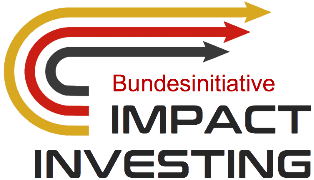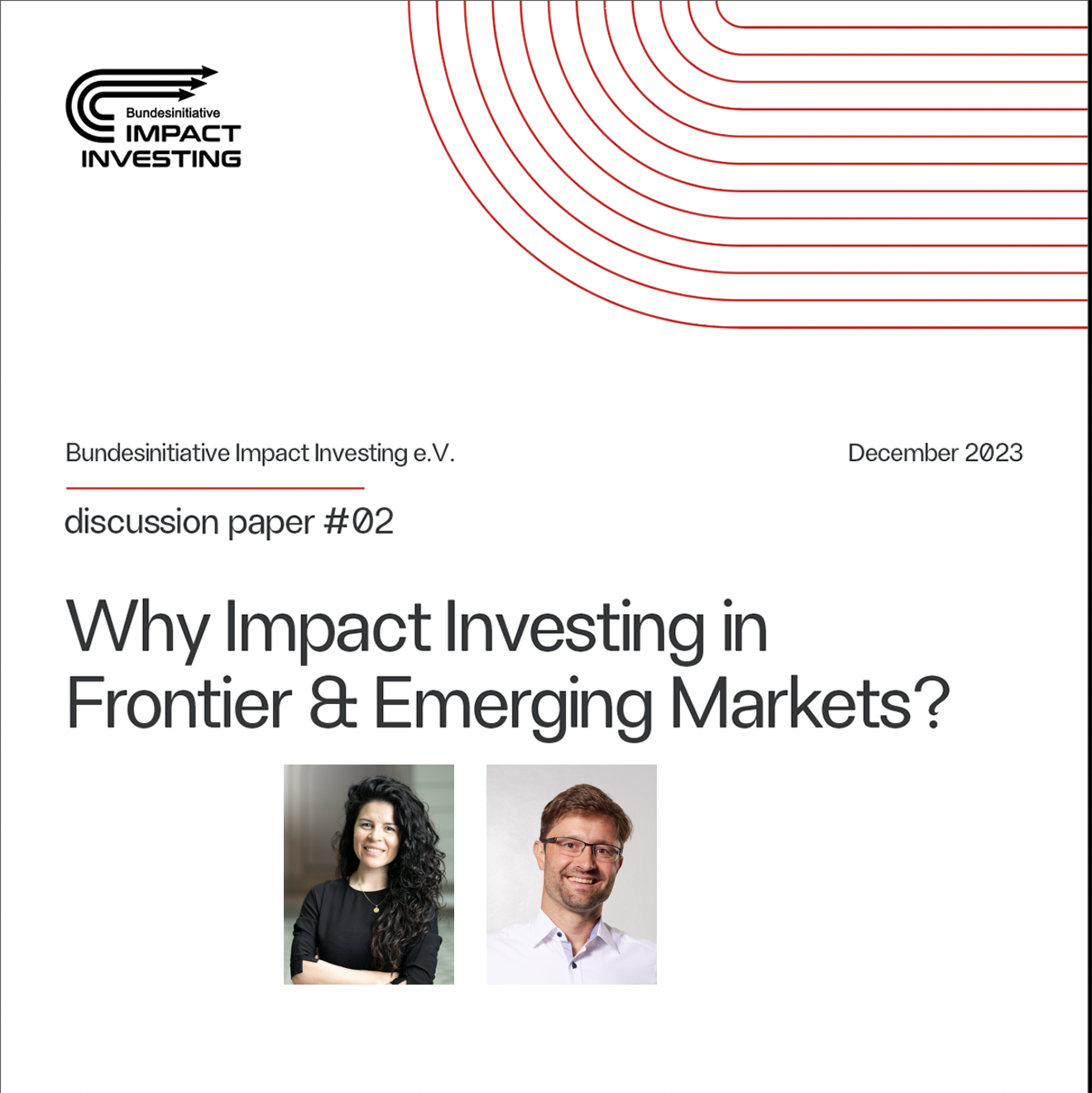To accompany the published discussion paper #02 Why Impact Investing in Frontier & Emerging Markets? please find here an interview with Dr.-Ing. Natalia Realpe Carrillo, CEO at HEDERA Sustainable Solutions and Dr. Julian Frede, Co-Founder and Managing Director of the evolutiq Impact Advisory, both part of the BIII Working Group “Frontier and Emerging Markets” (WG FEM):
As the major platform for impact investing, BIII represents the community in Germany and the DACH region. There is also the working group “Frontier and Emerging Markets” (FEM). Who is part of it and what are your goals?
Our FEM Working Group comprises organizations and individuals from the DACH region who are either working or interested in impact investment in these markets. Most participants are from (or closely related to) financial institutions active in these markets. The FEM WG’s primary objective is to enhance understanding and analysis, and to collaboratively address the unique challenges associated with impact investing in emerging and developing countries. By facilitating the exchange of experiences and encouraging peer-to-peer learning, the FEM WG aims to increase and promote investment volumes originating from Germany. To achieve this goal, we gather best practice examples, establish a network by organizing events, meetings, and panel discussions, and disseminate findings and recommendations. In this manner, we are contributing to the ongoing development of impact investing.
What is special about impact investing in FEMs? How does it differ from impact investing in developed countries?
Impact investing in frontier and emerging markets (FEMs) is distinguished by its dual focus on generating market-adequate financial returns and creating measurable positive social and environmental impacts. Unlike developed markets, FEMs present a unique blend of challenges and opportunities, including navigating specific risks such as uncertainties related to the currency, market, country, political situation, and regulations. Strategically collaborating with local entities, leveraging local knowledge, and employing innovative financing and risk management strategies are crucial for success here. FEMs offer a diverse range of impact-risk-return profiles, from microfinance initiatives to investments addressing critical issues, such as biodiversity loss and gender disparities. This diverges from the approach used in developed markets, where financial systems are more mature and stable, and impact opportunities and risks are different.
The paper outlines very compelling reasons to invest in FEMs. However, the current macroeconomic headwinds and geopolitical uncertainties present challenges for both developed and developing countries. What are your main takeaways?
Although the current macroeconomic headwinds and geopolitical uncertainties do indeed present challenges across both developed and developing countries, our analysis of frontier and emerging markets (FEMs) reveals several key takeaways about how to interpret or face these challenges.
- Resilience and Opportunity: Despite global challenges, FEMs offer unique opportunities for impact investing. These markets often demonstrate resilience and potential for growth, especially in sectors addressing social and environmental needs.
- Strategic Collaborations and Local Insights: Success in FEMs requires forming strategic partnerships with local entities and leveraging local knowledge. These collaborations are vital for navigating these markets’ specific challenges and risks.
- Diverse Impact Profiles: FEMs present a wide range of impact-risk-return profiles. Investments range from structured microfinance initiatives to groundbreaking projects tackling significant issues, such as biodiversity and gender disparities. This diversity allows for tailored investment approaches aligned with financial goals and impact objectives.
- Adaptability in the Face of Uncertainty: The dynamic nature of FEM requires a flexible investment approach. Investors must be adaptable, continuously assessing and responding to the evolving economic and geopolitical landscape.
Targeting specific environmental, social, and impact goals has long been the special terrain of governments, philanthropy, and non-profit organizations. Why would impact investors do the same? What about the financial returns?
Impact investing in FEMs meets the modern investor’s desire to achieve financial returns while making a positive, measurable impact on the world. Investors are doing different work, but come with a much stricter focus on economic viability, a critical add-on to the impact generation of many philanthropic or public organizations. The work of private impact investors thus both resembles and differs from that of public players, as their mandates focus more strongly on financial return, which in our view is a necessary add-on when targeting investable SDGs. Some examples:
Dual Returns: FEMs offer the potential for market-adequate financial returns alongside significant social and environmental impacts, aligning profit with purpose.
Unique Investment Opportunities: FEMs provide diverse investment opportunities in areas such as biodiversity and gender equality, with their untapped or emerging market nature often leading to competitive financial returns.
Risk Diversification of a Global Portfolio: Investing across various impact-focused initiatives helps mitigate risks and potentially enhances returns, making it a strategically sound choice.
Investor Demand: There is a growing trend – especially among younger investors, family offices, and institutions – to invest in ways that reflect their values and contribute to societal and environmental betterment without sacrificing financial gains.
FEM investments come with specific opportunities and risks. What advice would you give to investors who are new to FEM?
Investors new to FEM should find a partner. Or several partners. Going it on your own simply takes too long in today’s climate, and professional partners are available for each country, region, sector, and/or impact topic. Such partnerships massively reduce risks.
As for specific aspects to implement, market research, portfolio diversification, professional guidance, patience, and flexibility are all crucial for impact investors. A deep understanding of the economic, political, social, and environmental conditions of the respective countries and sectors is vital, as is a firm grasp of the market structure, regulations, accessibility of the FEMs and the potential opportunities and barriers. Strategies such as diversification reduce the risks of exposure to currency, governance, and climate risks. Professional guidance from fund managers, financial advisors, or experienced intermediaries can help investors to understand and identify the challenges and opportunities, as can utilizing systems to measure and manage impactful investments. Finally, FEM investments may have fluctuations and uncertainties. For this reason, regular monitoring of portfolio performance and its impact together with reviewing the objectives and goals achieved are key to ensuring the investment’s viability. Although many of these elements are features of professional financial portfolio management, investors are strongly advised to also consider ESG risk and impact management for further financial material. Impact investing is increasingly professionalizing along these lines, e.g. through market signals on impact management quality.

